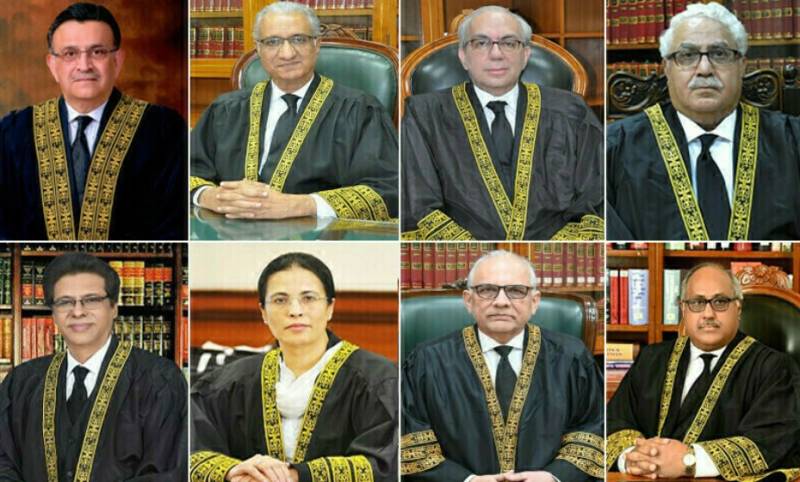Coalition parties reject Supreme Court larger bench as ‘controversial’
Term SC bench formation even before legislative process is complete ‘unprecedented’ and ‘unacceptable: Rue absence of judges from smaller provinces on the bench: Bench testament to divisions in apex court: Declare move as an attack on Parliament and its authority: Bench constitution in haste is ‘murder of justice’

Stay tuned with 24 News HD Android App

The political parties in the ruling coalition – Pakistan Democratic Movement (PDM) – government have branded the eight-judge Supreme Court larger bench, constituted to take up judicial reforms bill, as “controversial” and rejected the attempt of fixing the bill for hearing even before its enforcement, reported 24NewsHD TV channel.
In a joint statement issued in Islamabad on Thursday an hour before the start of the hearing at the apex court, the ruling coalition rejected the attempt to take up the Supreme Court Procedure and Practice Bill 2023, saying the apex court’s move to form a “controversial bench” even before the completion of the legislative process was “unprecedented” and “unacceptable”.
The coalition parties maintained that such a move had never been seen before in the history of Pakistan or the Supreme Court. It tantamount to destroying the credibility of the country’s highest court and reducing to meaningless the constitutional process of justice, they said.
They declared that this bench is itself a clear-cut proof of the divisions in the Supreme Court, which has again seconded the already-declared stance of the parties in the coalition government.
The joint statement of coalition partners also recalled that the apex court judges — Justice Qazi Faez Isa and Justice Aminuddin Khan — had in their earlier judgments openly expressed their objection to “one-man show”, biased and dictatorial behaviour, and the formation of special benches. “With the formation of the eight-member controversial bench, the facts stated in the judgments of these honourable judges have become more clear,” the statement said.
The ruling coalition further contended that the legal fraternity too had opposed the apex court’s move to take up the petitions against a proposed law. The coalition government also expressed concern regarding the non-inclusion of judges from smaller provinces i.e. Balochistan and Khyber Pakhtunkhwa.
“The ruling parties consider this move as an attack on the parliament and its authority, which will be strongly resisted. The constitution of the controversial bench in haste and fixing the bill for hearing, apart from the intent and intention, also clearly expresses the decision to come which is sad and tantamount to murder of justice,” the statement said.
It added that every attempt to take away the authority of the parliament and interfere in its constitutional scope will be strongly resisted. “There will be no compromise on the authority of the Parliament in the light of the Constitution of Pakistan,” the statement concluded.
Chief Justice of Pakistan Umar Ata Bandial had on Wednesday formed an eight-member larger bench to hear petitions filed against the Supreme Court (Practice and Procedure) Bill, 2023, which restricted the top judge’s powers to initiate suo motu proceedings and constitute benches on his own.
Justice Ijazul Ahsan, Justice Muneeb Akhtar, Justice Mazahar Ali Akbar Naqvi, Justice Muhammad Ali Mazhar, Justice Ayesha Malik, Justice Hasan Azhar Rizvi and Justice Shahid Waheed are the other members of the larger bench.
The bill, titled the Supreme Court (Practice and Procedure) Bill 2023, is aimed at depriving the office of the CJP of powers to take suo motu notice in an individual capacity. It was initially passed by both houses of parliament and sent to the president for his assent. However, the president had sent it back, saying that the proposed law travelled “beyond the competence of parliament”.
The bill was again passed by a joint sitting of the parliament with certain amendments, amid a noisy protest from PTI lawmakers on Monday.
Notably missing from the bench are Justices Qazi Faez Isa and Justice Aminuddin Khan who had earlier ruled that the CJP did not have the power to make special benches or decide its members and ordered the postponement of all suo motu matters. The order was later recalled by a six-member larger bench. Justice Isa, in a judicial note, later said that the bench did not “constitute a constitutional court”.
Reporter Awais Kiyani
